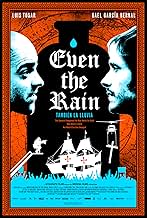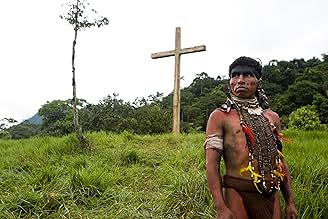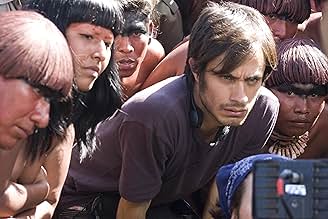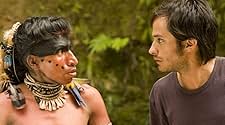IMDb RATING
7.4/10
15K
YOUR RATING
As a director and his crew shoot a controversial film about Christopher Columbus in Cochabamba, Bolivia, local people rise up against plans to privatize the water supply.As a director and his crew shoot a controversial film about Christopher Columbus in Cochabamba, Bolivia, local people rise up against plans to privatize the water supply.As a director and his crew shoot a controversial film about Christopher Columbus in Cochabamba, Bolivia, local people rise up against plans to privatize the water supply.
- Awards
- 22 wins & 17 nominations total
- Director
- Writer
- All cast & crew
- Production, box office & more at IMDbPro
Featured reviews
I really enjoyed the film "Even in the Rain" because the movie had two stories going side by side. It was like a movie inside a movie, which was one thing that I really enjoyed about the movie. Overall the movie was very easy to understand. There might have been one scene that was not that clear to me but I got the general idea of it anyways so it was not really a big problem. If this was an American film the problem would have been solved in the movie, so it different from American films. To my understanding the problem was not resolved in this film. This film taught me how people in other parts of the world are living today and that people do not have the things that we take for granted all time. Also this film sort of taught us about the past which I taught was very interesting. It showed us how the British were treating the Natives. If was the director of this film I would have made it so at the end of the film everyone had water.
This is a great movie; a movie inside another movie, a movie out of another movie. Told a story when the Spaniards under the command of Christopher Columbus brutalized and ransacked Bolivia, then the government was bought out and mustered in the big corporate came in modern time to raped the country, took away the local people's water resource, the well, the water supply. Just like what the demonstrators said: "They need the vapor from our breaths, the sweat on our brows, they even want to take the rain dropping from the sky(Even The Rain)". The third storyline is the movie company that wanted to take advantage of the poor country's poverty and high unemployment, getting the cheap labors to shoot the movie. "The truth got many enemy, the lie got many friends", "You don't understand, water is our life", these dialog are so profound and true. Unfortunately, the movie crew was in the wrong time and at the wrong place encountered the explosion of the street riots and the demonstrations. This is a very complicated movie but shot so well to portray all the involving parties and single person got their own demons, dilemmas, tensions, numbness, helplessness, and hopelessness,self-denial, cowardice, depression and frustrations. The complexity of this movie was so vividly painted on the big screen. This is a great movie.
"No problem can be solved from the same consciousness that created it" - Albert Einstein
In a film within a film, director Sebastian (Gael Garcia Bernal) and producer Costa (Luis Tosar) are shooting in Cochabamba, Bolivia in the year 2000. The film they are working on proposes to depict Christopher Columbus' exploitation of the indigenous native population in his voyage to the Americas and the effort of two priests to stand up to the Catholic Church. Written by Paul Laverty, the regular screenwriter for British director Ken Loach, and dedicated to the late progressive historian Howard Zinn, Iciar Bollain's openly political drama Even the Rain takes on the past history of exploitation of native populations, showing a parallel to current history.
The film developed through Laverty's desire to dramatize the life of Bartolomé de las Casas, a Dominican friar who becomes an anti-slavery activist in defiance of the church and his native Spain. Shot in the high Andes because of budgetary constraints, Even the Rain attempts to conflate three levels of exploitation: the historical treatment of the Native Americans by the Spanish conquerors in the 16th century, the actual attempt by Bolivia to cede control of the country's water supply to a British-American corporation, and the filmmakers' cost-cutting that results in the Quechua population being paid only $2.00 an hour as extras.
Opening with a "La Dolce Vita" shot of a wooden crucifix being transported to the mountains by helicopter, the film moves to an open casting call in Cochabamba as hundreds of Bolivians line up to audition for a role in the projected film. Turned away by the producer when the quota of locals is filled, Daniel (Juan Carlos Aduviri), a vocal political activist demands that the Bolivians be hired even after they are told to leave. As a result of his strong personality, he is selected to play the role of Hatuey, the first Indian to be crucified for resisting the Spanish and Christian empire.
A problem arises, however, when Daniel becomes the leader of a local group protesting the social injustice entailed in Bolivia's privatization of its own water supply (a true event that forbade the native population from collecting their own rainwater). Even after Daniel tells him "You don't understand, water is life," Costa demands that the young actor give up his political campaign to concentrate on the film which needs him desperately. As the director, Sebastian likewise must walk a thin line between balancing his ideals with his powerful desire to present a revisionist history of Columbus to the world. "The protests will be forgotten, but the film will last forever," he argues.
Tosar is outstanding as the arrogant producer who is drawn unwillingly into the political protest. Overheard on a phone call, Costa brusquely tells a foreign investor how he is putting one over on the locals, not realizing that Daniel, standing only a few feet away from him speaks English. Eventually, however, Costa is forced to choose between the success of the film and the demands of his conscience staring at him relentlessly.
Even the Rain tells us that understanding the past is meaningless unless that knowledge can be made relevant to the present day, a lesson that the characters must learn the hard way. In lesser hands, the film could easily have become didactic or preachy, but Bollain maintains a steady hand and the result is an engaging and powerful film that not only speaks out loudly against injustice, but does so with poetry and passion.
In a film within a film, director Sebastian (Gael Garcia Bernal) and producer Costa (Luis Tosar) are shooting in Cochabamba, Bolivia in the year 2000. The film they are working on proposes to depict Christopher Columbus' exploitation of the indigenous native population in his voyage to the Americas and the effort of two priests to stand up to the Catholic Church. Written by Paul Laverty, the regular screenwriter for British director Ken Loach, and dedicated to the late progressive historian Howard Zinn, Iciar Bollain's openly political drama Even the Rain takes on the past history of exploitation of native populations, showing a parallel to current history.
The film developed through Laverty's desire to dramatize the life of Bartolomé de las Casas, a Dominican friar who becomes an anti-slavery activist in defiance of the church and his native Spain. Shot in the high Andes because of budgetary constraints, Even the Rain attempts to conflate three levels of exploitation: the historical treatment of the Native Americans by the Spanish conquerors in the 16th century, the actual attempt by Bolivia to cede control of the country's water supply to a British-American corporation, and the filmmakers' cost-cutting that results in the Quechua population being paid only $2.00 an hour as extras.
Opening with a "La Dolce Vita" shot of a wooden crucifix being transported to the mountains by helicopter, the film moves to an open casting call in Cochabamba as hundreds of Bolivians line up to audition for a role in the projected film. Turned away by the producer when the quota of locals is filled, Daniel (Juan Carlos Aduviri), a vocal political activist demands that the Bolivians be hired even after they are told to leave. As a result of his strong personality, he is selected to play the role of Hatuey, the first Indian to be crucified for resisting the Spanish and Christian empire.
A problem arises, however, when Daniel becomes the leader of a local group protesting the social injustice entailed in Bolivia's privatization of its own water supply (a true event that forbade the native population from collecting their own rainwater). Even after Daniel tells him "You don't understand, water is life," Costa demands that the young actor give up his political campaign to concentrate on the film which needs him desperately. As the director, Sebastian likewise must walk a thin line between balancing his ideals with his powerful desire to present a revisionist history of Columbus to the world. "The protests will be forgotten, but the film will last forever," he argues.
Tosar is outstanding as the arrogant producer who is drawn unwillingly into the political protest. Overheard on a phone call, Costa brusquely tells a foreign investor how he is putting one over on the locals, not realizing that Daniel, standing only a few feet away from him speaks English. Eventually, however, Costa is forced to choose between the success of the film and the demands of his conscience staring at him relentlessly.
Even the Rain tells us that understanding the past is meaningless unless that knowledge can be made relevant to the present day, a lesson that the characters must learn the hard way. In lesser hands, the film could easily have become didactic or preachy, but Bollain maintains a steady hand and the result is an engaging and powerful film that not only speaks out loudly against injustice, but does so with poetry and passion.
I first got wind of the political situation in Bolivia around the time of the 2003 protests, and then during the 2005 presidential election that brought coca farmer Evo Morales to power, making him the country's first indigenous president. Oliver Stone's documentary "South of the Border" partly told the story of the World Bank-inspired water privatization in Bolivia: the World Bank forced Bolivia's government to pass a law making it illegal for people to collect rain in buckets since it would have broken the monopoly on water ownership.
Icíar Bollaín's "También la lluvia" ("Even the Rain" in English) tells the story of the privatization, contrasting it with Christopher Columbus's genocide against the Indians. Filmmakers Sebastian (Gael García Bernal) and Costa (Luis Tosar) arrive in Cochabamba to make a movie about Columbus's arrival in the Americas, and the Taino Indians' subsequent rebellion against the occupation. But the events depicted in their movie begin to play out in real life: when the government sets out to privatize the water supply, the actor playing Taino leader Hatuey is one of the leaders of the protests.
The movie - which is dedicated to Howard Zinn - obviously has as its main purpose to show the parallels between indigenous resistance 500 years ago and today. But more than anything, it should offer incite into the roots of the wave of progressive leaders who rose to power in South America during the first decade of the 21st century. I definitely recommend it.
Icíar Bollaín's "También la lluvia" ("Even the Rain" in English) tells the story of the privatization, contrasting it with Christopher Columbus's genocide against the Indians. Filmmakers Sebastian (Gael García Bernal) and Costa (Luis Tosar) arrive in Cochabamba to make a movie about Columbus's arrival in the Americas, and the Taino Indians' subsequent rebellion against the occupation. But the events depicted in their movie begin to play out in real life: when the government sets out to privatize the water supply, the actor playing Taino leader Hatuey is one of the leaders of the protests.
The movie - which is dedicated to Howard Zinn - obviously has as its main purpose to show the parallels between indigenous resistance 500 years ago and today. But more than anything, it should offer incite into the roots of the wave of progressive leaders who rose to power in South America during the first decade of the 21st century. I definitely recommend it.
EVEN THE RAIN, directed by Icíar Bollaín, is a compelling film which attempts to explore the history of global economics using a kind of cinematic metaphor. Bollain's film focuses on a multinational movie crew that travels to Bolivia to make a film about Christopher Columbus, and examines his agenda of religious, cultural, and monetary exploitation of The New World. The production company hits a snag when locally violent demonstrations breakout against corporate ownership of indigenous water rights, and threaten to make the completion of the film impossible. The movie shows that the issues of wealth, ownership, and power are just as contentious today as they were five hundred years ago. Corporate giants of our era employ the same greedy strategy in an attempt to steal wealth, power, and access from the uninformed and defenseless. Although the ethical issues in the film are sometimes presented in a slightly heavy-handed manner, by the end of the feature, it is evident that the application of rapacious economic policy hasn't changed much since monarchs ruled the world.
Did you know
- TriviaThe scene where the little girl sees herself on screen was kind of a self homage by director/actress Icíar Bollaín. She wanted to transmit her first impression when she saw herself on screen being a teenager.
- ConnectionsFeatured in Ebert Presents: At the Movies: Episode #1.6 (2011)
- How long is Even the Rain?Powered by Alexa
Details
Box office
- Gross US & Canada
- $518,017
- Opening weekend US & Canada
- $53,730
- Feb 20, 2011
- Gross worldwide
- $7,313,485
- Runtime
- 1h 43m(103 min)
- Color
- Sound mix
- Aspect ratio
- 2.35 : 1
Contribute to this page
Suggest an edit or add missing content



















